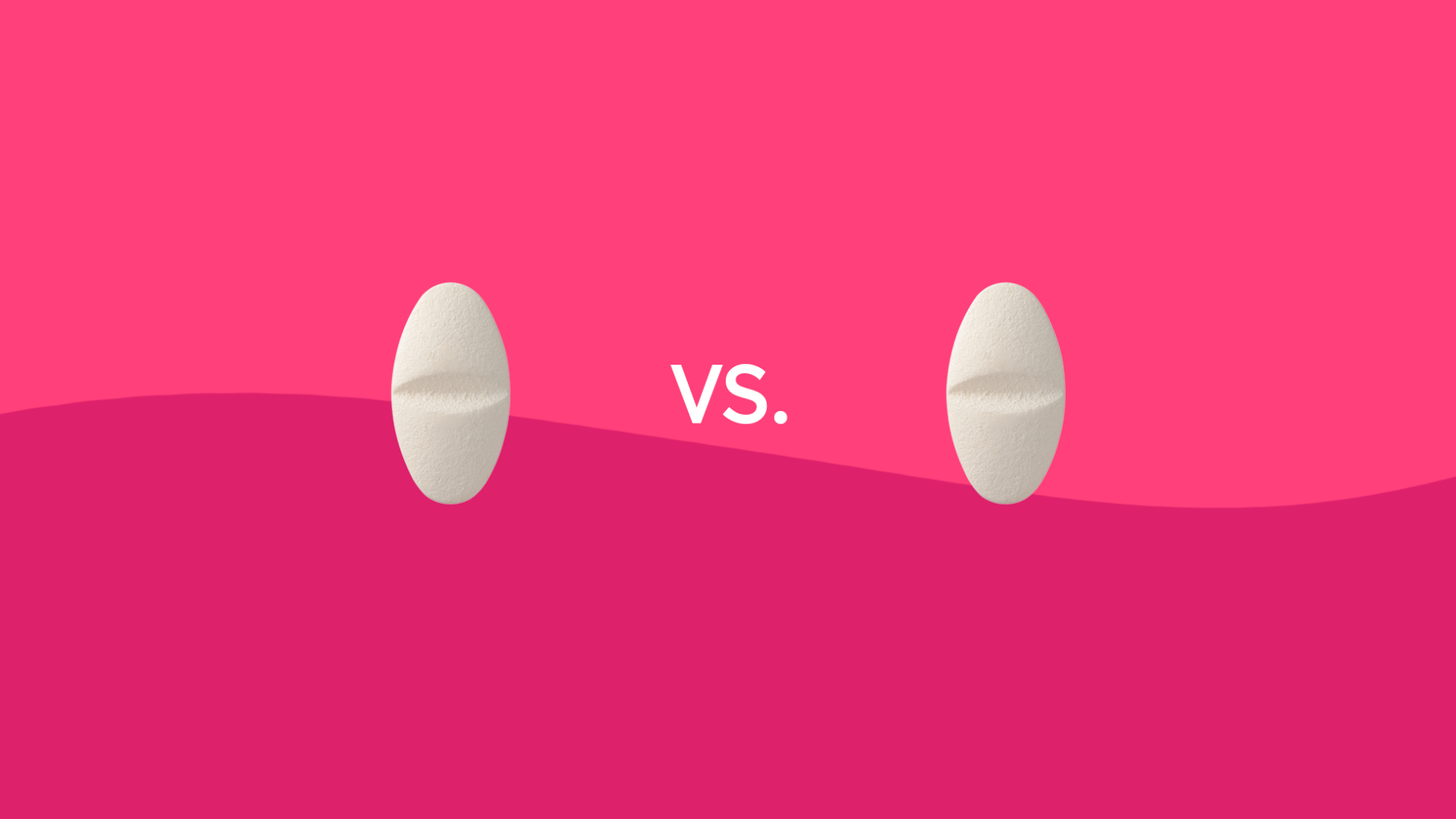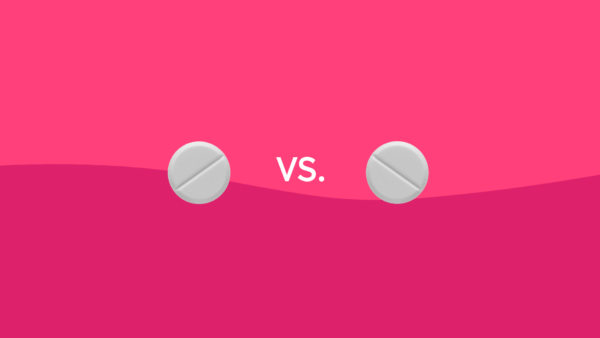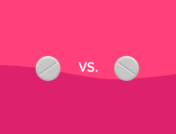Drug overview & main differences | Conditions treated | Efficacy | Insurance coverage and cost comparison | Side effects | Drug interactions | Warnings | FAQ
More than 17 million American adults have depression (major depressive disorder—MDD). Recent events, like the COVID-19 pandemic, have been a tremendous source of anxiety, affecting the mental health of many people.
Trintellix (vortioxetine) and Viibryd (vilazodone) are antidepressants. Both medicines are approved by the United States Food and Drug Administration (FDA) and are available by prescription. Takeda Pharmaceuticals, Inc. makes Trintellix; Allergan, Inc. makes Viibryd. Trintellix or Viibryd may be used in combination with psychotherapy with a psychologist or psychiatrist.
Trintellix and Viibryd are part of a group of medications called selective serotonin reuptake inhibitors (SSRIs). The antidepressant effect occurs when SSRIs increase serotonin levels in the brain, helping to improve depression symptoms. Both drugs have other activity on serotonin receptors, but the significance of this additional activity is not known or understood. For this reason, they are sometimes referred to as atypical antidepressants or serotonin modulators.
What are the main differences between Trintellix and Viibryd?
Trintellix (vortioxetine) is an SSRI medication. It is also classified as a serotonin modulator or atypical antidepressant. Trintellix is available in brand name only, in tablet form. Trintellix can be used in adults only—it has not been studied in children. (Note: Trintellix was originally called Brintellix, but the name was changed to avoid confusion with Brilinta, an antiplatelet medicine.)
Viibryd (vilazodone) is also an SSRI medication available in brand-name, tablet form. Like Trintellix, Viibryd is also grouped as a serotonin modulator or atypical antidepressant. Viibryd is not approved for use in children. It is only indicated for use in adults.
| Main differences between Trintellix and Viibryd | ||
|---|---|---|
| Trintellix | Viibryd | |
| Drug class | SSRI (selective serotonin reuptake inhibitor)/atypical antidepressant/serotonin modulator | SSRI (selective serotonin reuptake inhibitor)/atypical antidepressant/serotonin modulator |
| Brand/generic status | Brand | Brand |
| What is the generic name? | Vortioxetine | Vilazodone |
| What form(s) does the drug come in? | Tablet | Tablet |
| What is the standard dosage? | Start at 10 mg per day, then increase to 20 mg per day if tolerated. | Start at 10 mg per day for 7 days, then increase to 20 mg per day if needed. Take with food. |
| How long is the typical treatment? | Varies | Varies |
| Who typically uses the medication? | Adults | Adults |
Conditions treated by Trintellix and Viibryd
Trintellix and Viibryd are both indicated to treat MDD, or major depressive disorder (major depression), in adults. Neither drug is approved for use in pediatric patients.
Trintellix or Viibryd are sometimes prescribed off-label for generalized anxiety disorder or other conditions.
| Condition | Trintellix | Viibryd |
| Major depressive disorder (MDD) in adults | Yes | Yes |
| Generalized anxiety disorder | Off-label | Off-label |
Is Trintellix or Viibryd more effective?
One study looked at 21 antidepressant medications, including Trintellix and Viibryd. The study found Trintellix to be one of the more effective and better-tolerated antidepressants. There is very little data comparing the two drugs head to head.
The most effective drug for you can only be determined by your healthcare provider, who can take into account your medical conditions and history, and any medications you take that could interact with Trintellix or Viibryd.
Coverage and cost comparison of Trintellix vs. Viibryd
Trintellix is covered by most insurance and Medicare prescription plans. The out-of-pocket cost is around $500 for 30, 20 mg tablets. A free SingleCare card can lower the price to approximately $345.
Most insurance and Medicare prescription plans cover Viibryd. The out-of-pocket cost for 30, 20 mg tablets can cost nearly $400. With a free SingleCare card you can pay as little as $278 at participating pharmacies.
Insurance plans vary. Contact your insurance company for up-to-date insurance coverage information.
| Trintellix | Viibryd | |
| Typically covered by insurance? | Yes | Yes |
| Typically covered by Medicare Part D? | Yes | Yes |
| Standard dosage | 30, 20 mg tablets | 30, 20 mg tablets |
| Typical Medicare copay | $3-$14 | $1-$10 |
| SingleCare cost | $345+ | $278+ |
Common side effects of Trintellix vs. Viibryd
The most common side effect of Trintellix is nausea. This nausea tends to be mild to moderate and lasts for approximately two weeks. Other common adverse events of Trintellix include sexual side effects, nausea, constipation, vomiting, diarrhea, dry mouth, and dizziness.
The most common side effects of Viibryd are diarrhea, nausea, vomiting, and insomnia.
With each new or refilled prescription of Trintellix or Viibryd, you will receive a medication guide that discusses side effects, warnings, and other important information.
This is not a full list of side effects. Other adverse effects may occur. Consult your healthcare provider for a complete list of possible side effects.
| Trintellix* | Viibryd | |||
| Side effect | Applicable? | Frequency | Applicable? | Frequency |
| Headache | Yes | % not reported | Yes | 15% |
| Nausea | Yes | 21%-32% | Yes | 22% |
| Vomiting | Yes | 5%-6% | Yes | 4% |
| Ejaculation disorder/sexual dysfunction | Yes | 16%-34% | Yes | 1%-3% |
| Diarrhea | Yes | 7%-10% | Yes | 26% |
| Constipation | Yes | 3%-6% | No | – |
| Dry mouth | Yes | 6%-8% | Yes | 8% |
| Drowsiness | No | – | Yes | 4% |
| Dizziness | Yes | 6%-9% | Yes | 6% |
| Insomnia | No | – | Yes | 7% |
| Weight gain | Yes | % not reported but states “no significant effect on body weight” | Yes | 1%-2% |
*side effects depend on dosage
Source: DailyMed (Trintellix), DailyMed (Viibryd)
Drug interactions of Trintellix vs. Viibryd
Because both drugs are in the same category, they have similar drug interactions.
MAOI (monoamine oxidase inhibitors) interact with Trintellix and Viibryd. Their use must be separated by 14-21 days, depending on the individual treatment plan. Combining an MAOI with Trintellix or Viibryd increases the risk of serotonin syndrome, a life-threatening medical emergency due to excess serotonin.
Triptans such as Imitrex (sumatriptan), and other antidepressants, such as Prozac or Cymbalta, should not be combined with Trintellix or Viibryd due to the risk of serotonin syndrome.
The cough suppressant dextromethorphan (found in Robitussin-DM as well as many other cough and cold products) should be avoided because it can also cause serotonin syndrome when combined with Trintellix or Viibryd.
Other drugs that may interact with Trintellix or Viibryd include non-steroidal anti-inflammatory drugs (NSAIDs) such as aspirin or ibuprofen, and anticoagulants (blood thinners) like warfarin. Avoid alcohol when taking Trintellix or Viibryd.
This is not a full list of drug interactions. Consult your healthcare provider for a complete list of drug interactions.
| Drug | Drug class | Trintellix | Viibryd |
| Phenelzine Rasagiline Selegiline Tranylcypromine |
MAOIs | Yes | Yes |
| Alcohol | Alcohol | Yes | Yes |
| Rizatriptan Sumatriptan Zolmitriptan |
Triptans | Yes | Yes |
| St. John’s Wort | Supplement | Yes | Yes |
| Warfarin | Anticoagulant | Yes | Yes |
| Codeine Hydrocodone Morphine Oxycodone Tramadol |
Opioids | Yes | Yes |
| Dextromethorphan (in many cough and cold products) | Cough suppressant | Yes | Yes |
| Aspirin Ibuprofen Meloxicam Nabumetone Naproxen |
NSAIDs | Yes | Yes |
| Desvenlafaxine Duloxetine Venlafaxine |
SNRI antidepressants | Yes | Yes |
| Amitriptyline Desipramine Imipramine Nortriptyline |
Tricyclic antidepressants | Yes | Yes |
| Alprazolam Clonazepam Diazepam |
Benzodiazepines | No | Yes |
| Digoxin | Cardiac glycoside | No | Yes |
| Carbamazepine Phenytoin Rifampin |
Strong inducers of enzyme cytochrome P 450 3A4 | Yes | Yes |
| Clarithromycin Itraconazole Ketoconazole |
Strong inhibitors of enzyme cytochrome P 450 3A4 | No | Yes |
Warnings of Trintellix and Viibryd
All SSRIs, including Trintellix and Viibryd, have a black box warning (the strongest warning required by the FDA) of suicidality. Children, adolescents, and young adults (up to 24 years old) who take antidepressants have an increased risk of suicidal thoughts and behavior. All patients on antidepressant medications should be carefully monitored.
Other warnings include:
- Serotonin syndrome is a life-threatening emergency caused by too much serotonin. Patients taking Trintellix or Viibryd should be monitored for signs and symptoms of serotonin syndrome, including hallucinations, seizures, changes in blood pressure, and agitation. Patients should seek emergency medical treatment if symptoms occur. Other drugs that increase serotonin levels (triptans, tricyclic antidepressants, fentanyl, lithium, tramadol, tryptophan, buspirone, dextromethorphan, amphetamines, St. John’s Wort, and MAOIs) increase the risk of serotonin syndrome when combined with Trintellix or Viibryd.
- SSRIs may increase the risk of bleeding, and the risk increases with concomitant use of aspirin, NSAIDs, or warfarin.
- Activation of mania or hypomania may occur. In patients with bipolar disorder, an antidepressant may precipitate a mixed/manic episode.
- Avoid SSRIs or use with caution in patients with untreated anatomically narrow angles (angle-closure glaucoma). Ask your healthcare provider if you are at risk.
- Hyponatremia (low sodium levels) due to the syndrome of inappropriate antidiuretic hormone secretion (SIADH) may occur. Patients may experience headaches, difficulty concentrating, memory impairment, confusion, weakness, and unsteadiness, possibly leading to falls. Patients should seek emergency treatment if symptoms occur and discontinue the SSRI.
- When discontinuing Trintellix or Viibryd, the medication should be tapered gradually to avoid withdrawal symptoms such as nausea, irritability, confusion, headaches, and seizures. Do not abruptly stop taking Trintellix or Viibryd. Your healthcare provider can advise you on the best way to discontinue Trintellix or Viibryd.
- Do not drive (or operate machinery) until you know how Trintellix or Viibryd affects you.
- If you have a history of seizures, talk to your healthcare provider about using Trintellix or Viibryd.
- In rare cases, allergic reactions may occur. If you experience allergic symptoms or trouble breathing, stop taking Trintellix or Viibryd, and immediately seek medical treatment.
Trintellix or Viibryd should only be used in pregnancy if the benefit to the mother is greater than the risk to the baby. Stopping the medication may cause a relapse of depression or anxiety. Therefore, patients should be evaluated on a case-by-case basis. Your healthcare provider can weigh the risk versus benefits of using an SSRI during pregnancy. Neonates exposed to SSRIs in the third trimester have developed complications requiring prolonged hospitalization, respiratory support, and tube feeding. If you are already on Trintellix or Viibryd and find out you are pregnant, contact your healthcare provider immediately.
Frequently asked questions about Trintellix vs. Viibryd
What is Trintellix?
Trintellix is an SSRI, or selective serotonin reuptake inhibitor. Because of its other activity on serotonin receptors, it is also classified as an atypical antidepressant. It is available in brand name form and is used to treat depression in adults.
What is Viibryd?
Viibryd is a brand-name SSRI. Like Trintellix, it is also classified as an atypical antidepressant. Viibryd is used to treat depression in adults.
Are Trintellix and Viibryd the same? / What antidepressant is similar to Viibryd?
Trintellix and Viibryd both act like SSRI antidepressant prescription drugs. Other SSRI drugs you may have heard of include Celexa (citalopram), Lexapro (escitalopram), Luvox (fluvoxamine), Paxil (paroxetine), Prozac (fluoxetine), and Zoloft (sertraline).
However, although Trintellix and Viibryd act like SSRIs, they also work in other ways on serotonin receptors, which are not completely understood. Viibryd is officially categorized as an SSRI and a 5-HT1A partial agonist. Trintellix is classified as an SSRI and acts as an antagonist, agonist, and partial agonist of multiple serotonin receptors. Due to their activity, they are also known as atypical antidepressants. Other atypical antidepressants include:
- Bupropion (Wellbutrin SR, Wellbutrin XL)
- Mirtazapine (Remeron)
- Trazodone
Another similar (but not the same) antidepressant drug class is the SNRI class, which stands for serotonin-norepinephrine reuptake inhibitors. This class includes drugs like Cymbalta (duloxetine), Effexor (venlafaxine), Pristiq (desvenlafaxine), and Fetzima (levomilnacipran).
Is Trintellix or Viibryd better?
While both drugs were approved based on placebo-controlled studies, studies have not compared the two drugs directly. One extensive review of many studies (see above) found Trintellix to be among the more effective and better-tolerated antidepressants. However, the best drug for you can only be determined by your doctor, who can look at the full picture of your medical conditions and history and other medications you take.
Can I use Trintellix or Viibryd while pregnant?
Consult your healthcare provider for medical advice. They will weigh the benefits of taking an antidepressant versus the risk to the baby. Neonates exposed to certain antidepressants, including SSRIs, in the third trimester of pregnancy, have developed serious complications.
If you are already on Trintellix or Viibryd and find out that you are pregnant, consult your OB-GYN immediately for advice. If you are breastfeeding, consult your OB-GYN as well.
Can I use Trintellix or Viibryd with alcohol?
No. Trintellix or Viibryd should not be taken with alcohol because the combination may increase the risk of respiratory depression (slowed breathing, not getting enough oxygen) and increase sedation and drowsiness, and impair alertness. The combination can also worsen anxiety and depression.
Does Viibryd help anxiety?
Although Viibryd is not approved to treat anxiety, studies have shown that it can help treat generalized anxiety disorder. Therefore, Viibryd may sometimes be prescribed off-label for anxiety.
Is Viibryd for bipolar?
Viibryd is not indicated to treat bipolar disorder. It is only indicated for use in depression. Patients should be screened for bipolar disorder before taking Viibryd. The prescribing information for Viibryd states that in patients with bipolar disorder, using Viibryd or another antidepressant to treat a depressive episode can cause a mixed/manic episode.
Related Resources:





